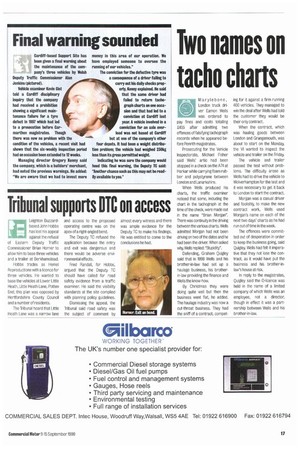Two names on tad° charts
Page 19

If you've noticed an error in this article please click here to report it so we can fix it.
Marylebone, London truck driver Eamon Wells was ordered to pay tines and costs totalling g455 after admitting two offences of falsifying tachograph records when he appeared before Penrith magistrates.
Prosecuting for the Vehicle Inspectorate, Michael Fisher said Wells' artic had been stopped in a check on the A74 at Harker while carrying foam rubber and polystyrene between London and Lanarkshire.
When Wells produced his charts, the traffic examiner noticed that some, including the chart in the tachograph at the time of the check, were made out in the name "Brian Morgan". There was continuity in the driving between the various charts. Wells admitted Morgan had not been driving on two of the dates and he had been the driver. When asked why, Wells replied; "Stupidity".
Defending, Graham Quigley said that in 1998 Wells and his brother-in-law had set up a haulage business, his brotherin-law providing the finance and Wells the know-how.
By Christmas they were doing quite well but then the business went flat, he added. The haulage industry was now a cut-throat business. They had the sniff of a contract, compet
ing for it against a firm running 400 vehicles. They managed to win the deal after Wells had told the customer they would be their only contract.
When the contract, which was hauling goods between London and Grangemouth, was about to start on the Monday, the VI wanted to inspect the vehicle and trailer on the Friday.
The vehicle and trailer passed the test without problems. The difficulty arose as Wells had to drive the vehicle to Wolverhampton for the test and It was necessary to get A back to London to start the contract Morgan was a casual driver and foolishly, to make the new contract work, Wells used Morgan's name on each of the next two days' charts as he had run out of time inthe week.
The offences were committed out of desperation in order to keep the business going, said Quigley. Wells had felt it imperative that they not lose the contract, as it would have put the business and his brother-inlaw's house at risk.
In reply to the magistrates, Quigley said the 0-licence was held in the name of a limited company of which Wells was an employee, not a director, though in effect it was a partnership between Wells and his brother-in-law.












































































































